Happy Friday!
And welcome to what can only be described as the improbable future. This week I’ve been working on series four of Foiled, postponed since March, but which will now hopefully be recorded remotely in front of a non-existent studio audience, sometime in early December. Insha’allah.
Do you have plans this winter? I wish you courage to plan the future; serenity to accept its reality; and wisdom to mark the difference. Or, in the wise words of Charles Perrault’s Mother Goose:
For every ailment under the sun
There is a remedy, or there is none;
If there be one, try to find it;
If there be none, never mind it.
This week’s newsletter is an elegant affair, by which I mean shorter. Enjoy!
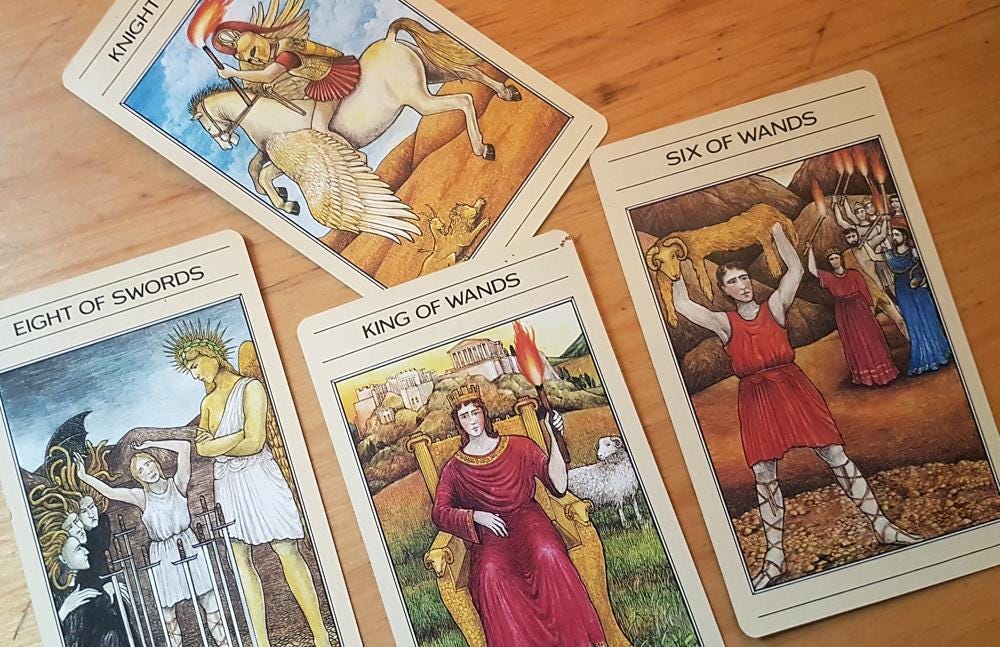
Above: My tarot reading from last Saturday night. Does anyone have a flying horse I can borrow?
Swallow the rainbow
In the greengrocers, I met an elderly man who’d ‘spent the last week in bed’. He shook his head at me as he fumbled for the word ‘avocado’. The Platonic Form of an avocado floated in his mind—‘Rough, green...’—but the abstraction stayed maddenly out of reach.
‘Kiwi!’ I guess.
He shook his head again, this time at the world around him. ‘What do you make of it, bud? What a mess we’re in.’ I made some optimistic comment like, ‘We’ve survived worse’ and I was surprised by his abrupt reversal: ‘Oh yes, my man,’ he said with feeling. ‘Believe me, I’ve survived worse!’
This man was probably born the wrong side of the Second World War and remembers well the food shortages and fuel shortages. I found out today that there was a timber shortage in the 1960s and the door frames of our apartment were built with metal. The strength of this survivor’s feeling as he shopped for avocados and groped for words gave me a glimpse of our privilege.
The sun shone and we are surrounded by a rainbow of colours: striped pumpkins and carmine tomatoes, tricolour peppers and blanched potatoes, pale celery and deepest broccoli, gaudy bananas and russet apples, wine dark berries and chestnut mushrooms, blonde figs and treacle dates. The shop manager fills the man’s bags with colour and loads them up onto his mobility scooter.
‘Oh yes,’ the man chuckles to himself, shaking his head. ‘Haven’t we been through worse?’
At work, I’ve been covering a conference about big data in agriculture. One of the conference organisers, the environmental scientist Dr Andy Jarvis, made this comment about the pandemic:
We were all expecting a food system collapse—people were panic buying and didn’t have confidence in the food system and in our farmers. But the farming community has worked incredibly hard, the food system has stood up, and we’ve all remained well-nourished through this crisis. A big thank you to all the farmers.
Next time you’re in your local greengrocers, look around you at the colours on display. Look more closely and see the fingerprints of the farm workers who planted the seeds, the soil, light and water that grew the plant, and the robust food system that brought these colours to your high street.
Buy the freshest food you can, make something delicious and swallow the rainbow.
Dave’s New Food Column
(Title suggestions welcome)
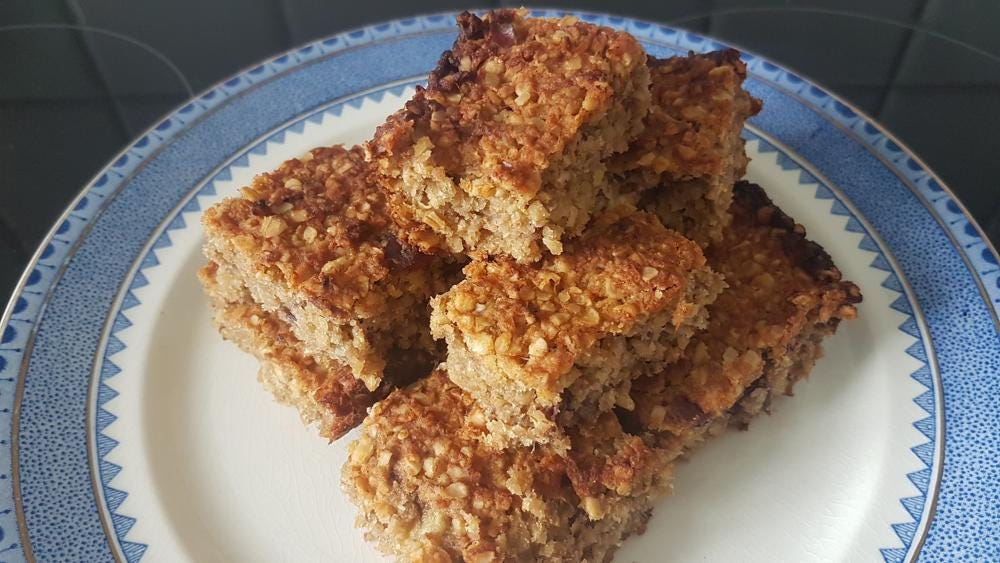
Above: Making an effort with simple flapjacks, sweetened and bound with dates and banana
If I’ve learned one thing about eating vegan in the past six months, it’s that I need to make more of an effort if I’m not going to die—not of malnutrition, but of boredom. I’ve often thought of this as a bad thing, but it’s actually an extremely good thing. (When I can be arsed.)
Non-veganism made me lazy. Any ragtag collection of roasted vegetables could go from gross to gourmet in the time it takes to grate half a pound of Davidstow. Strip out the dairy, however, and the vegan remains are revealed for what they truly are: hastily thrown together and technically edible plants flavour-masked with lashings of chilli sauce.
The only response, short of depressing vegan junk food, is to improve my cooking combinations, by practicing flavoursome recipes. This is mildly profound: I’ve always been happy putting time into cooking for others, but now I have to acknowledge that me, myself and I are worth cooking well for.
So I bought a cookbook: Dirty Vegan by former professional skateboarder Matt Pritchard. (Two series of Dirty Vegan are also available on BBC iPlayer)
One of the issues with veganism is the paucity of fatty treat foods. The human brain loves two kinds of foods above all else: fats and carbs.
Thousands of years of human ingenuity have created dairy fats prepared and packaged into delightful forms for our brains: cream, cheese and cream cheese, to name but three. Vegan fats are manifestly not. Things are improving—step forward Naturli vegan block, the affordably tasty butter-killer—but there is a long way to go.
The temptation for vegans, then, is to depend on carbs. But, because there’s only so much bread that you can eat, sugar starts to creep into the diet. More raisins, prunes and dates; bananas, apples and berries; biscuits are a temptation for the first time in years. Sugar creep is the only reason I’ve ever wondered whether my vegan diet is any healthier for me than my old dairy diet.
The solution is the same: make an effort. I can’t slop a quart of cream into a bowl with oats and nuts as a dairy treat. Instead, I need to spend an hour making a tray of ‘no-sugar’ vegan flapjacks or maltloaf. And that’s a good thing. It’s good for me, it’s good for the planet and—this is the kicker for me—it’s good for other people.
You see, not many other humans would put up with a daily diet consisting of roasted vegetables (no matter how much cheese) and a bowl of cream. If I want to delight my friends, then I need to become the sort of person who puts time and effort into making tasty, satisfying and healthy food. And preparing food for others has to begin in the workshop, preparing food for myself.
Last weekend I made a full Bristolian breakfast for a friend’s birthday: five guests around the table, some vegan, most not. Scrambled tofu, garlic mushrooms, smokey beans, spinach, toast and mimosas. That it was vegan was irrelevant; it was nutritious and delicious.
Well worth the effort.
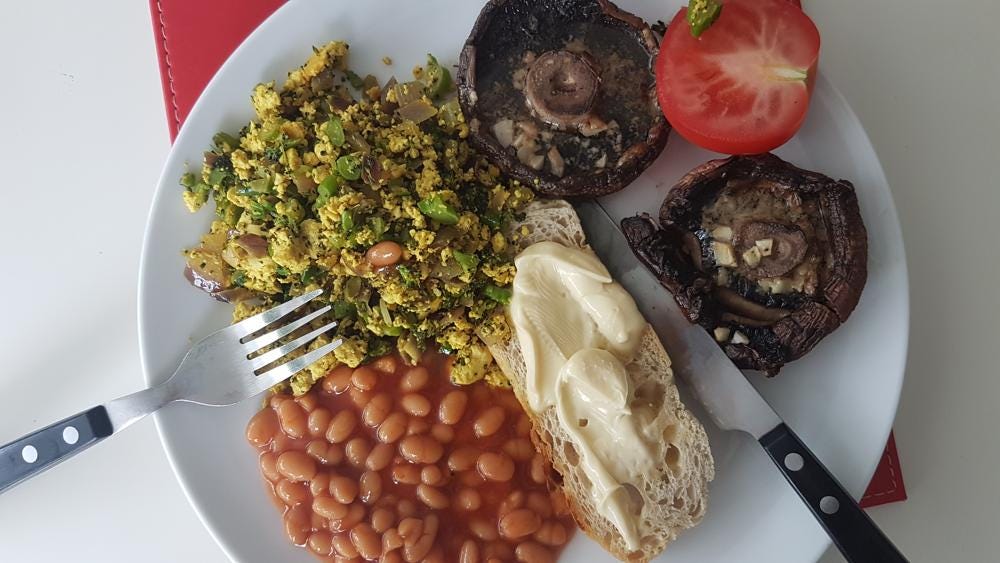
Above: Making an effort with breakfast: garlic mushrooms and scrambled tofu—labelled by my collaborator as ‘a triumph’. Recipes by Dirty Vegan (since this photograph, I’ve also made his smokey baked beans and they’re banging)
~
What do you think of Dave’s New Food Column? Anything you’d like me to cover?
✒️ Recently…
💥 Tintin Versus The Foo Fighters (16 October)
🧠 Stroke Values (9 October)
🌿 Britain: Dope Capital of the World (9 October)
🐑 This Means Moor (2 October)
📣 Death of an Anarchist (4 September)
🚴 Always available: the collected scribblings of my round Britain cycling adventures
Any more for any more?
First of all, three serious text links
Monday was the anniversary of the day in 1944 when Viktor Frankl was transferred to Auschwitz. Read along with the Man’s Search for Meaning 5-a-day Book Cult.
MIT have released a free online course called COVID-19, SARS-CoV-2 and the Pandemic. The first seven lectures are already up for you to watch.
Trying to break an addiction to your phone? Take advice from the ultimate habit-breakers: smokers who quit. As you know, I’m fascinated by habit-formation and this very practical article by McKinley Valentine on Medium is quite brilliant. Poetry, urge-surfing and Allen Carr: what’s not to love?
Phone addiction is a constant, low-level annoyance and distraction that you really shouldn’t just put up with. It’s like having a pebble in your shoe all day and finally removing it.
Now three beautiful photographs
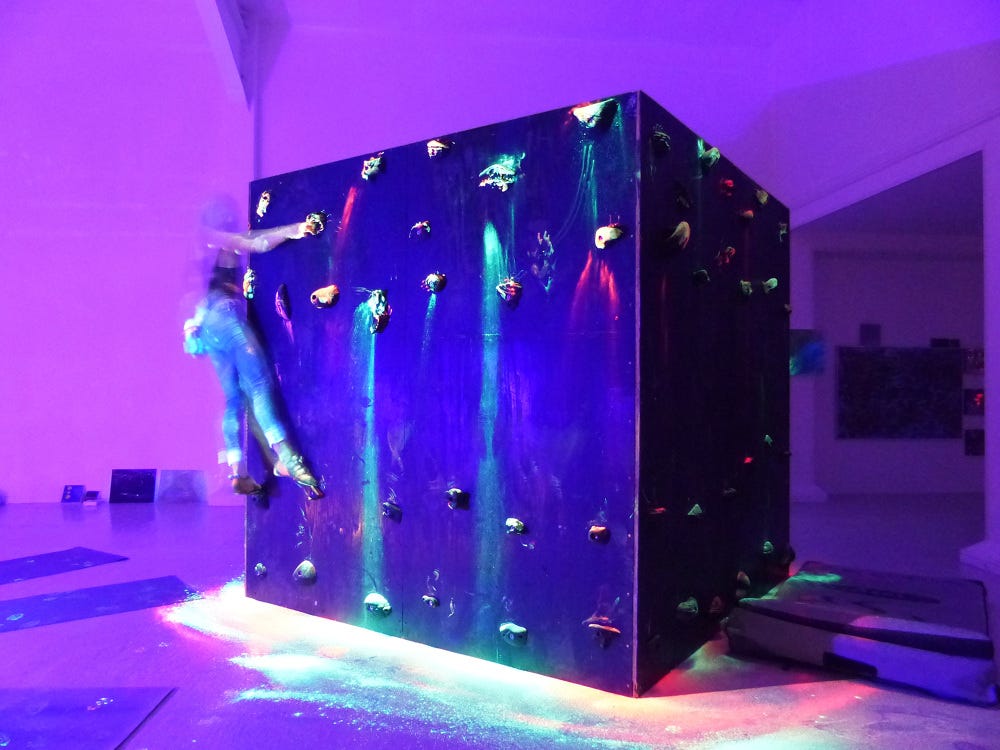
Above: Artist, therapist and climber Lee Simmons created ‘Our fingertips are made of stardust’, an art installation using UV light and fluro dust. Gorgeous.
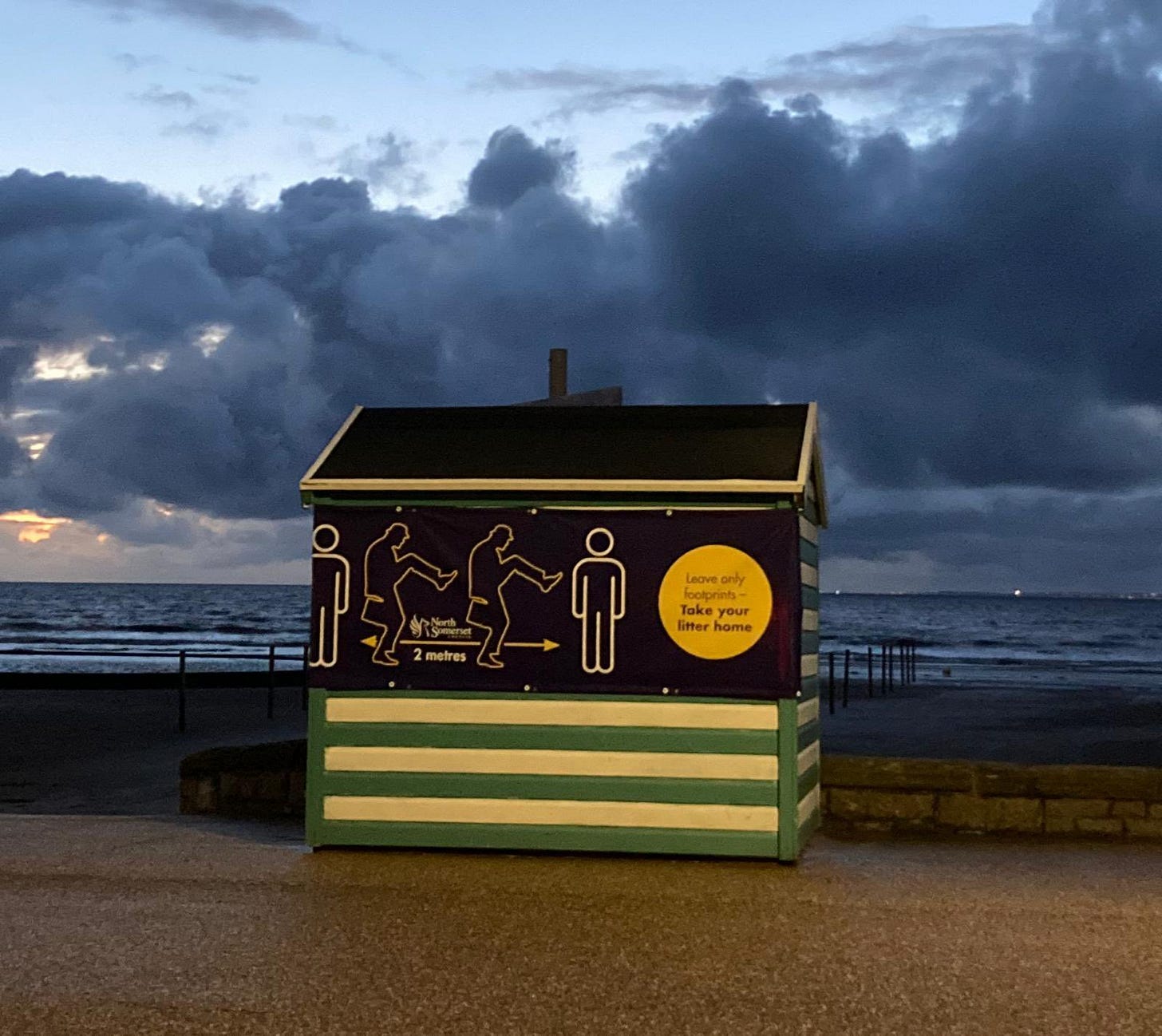
Above: Monty Python’s Social Distancing, spotted in Weston-Super-Mare by Emma Garland
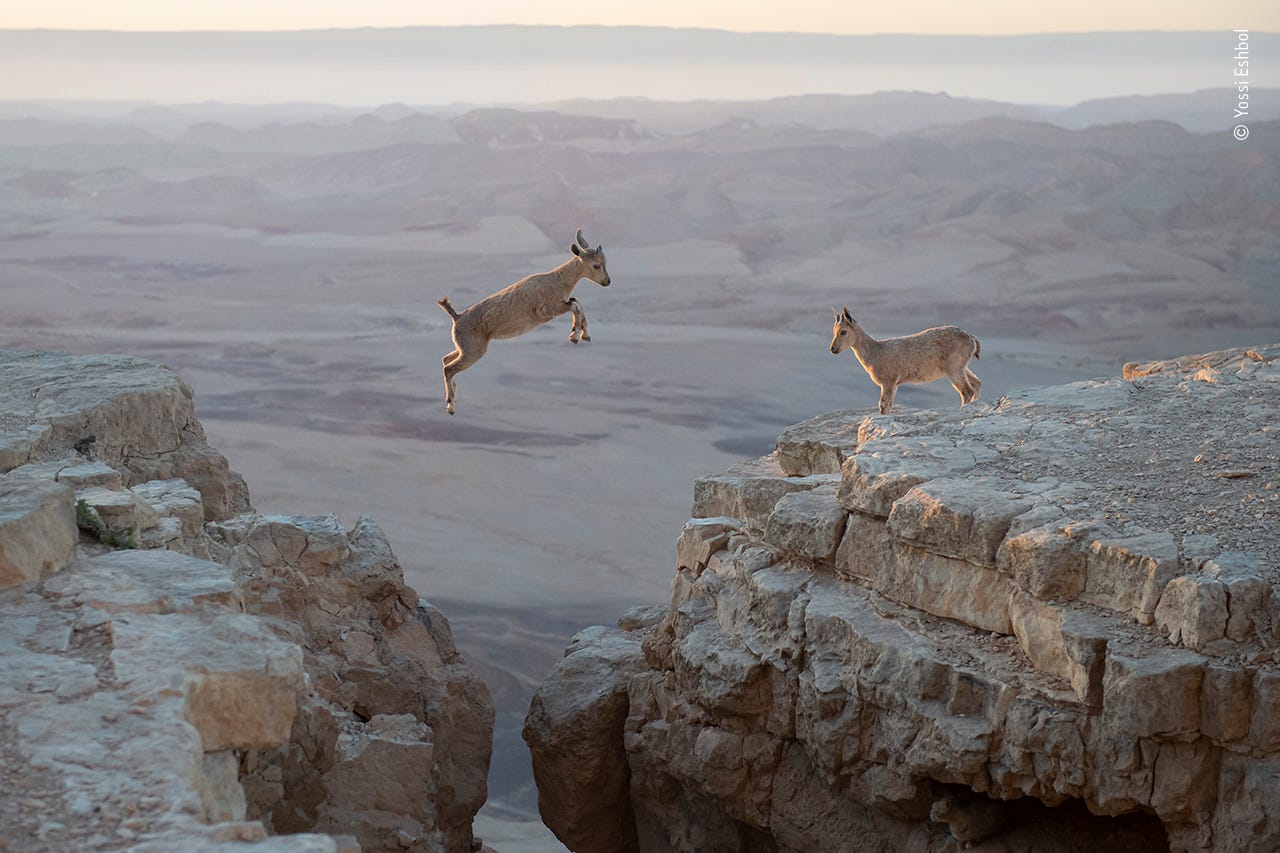
And, finally, an awesome video
Bikes rule!
Next week I have planned much more writing, but also an excursion to Suffolk with the family, some chickens and a few llamas. Then again, who dares to make plans these days?
Dare greatly,
dc:
CREDITS
Hello, I’m David Charles and I wrote this newsletter. I publish another newsletter about reading called Books Make Books. I’m co-writer of BBC Radio Wales sitcom Foiled, and also write for The Bike Project, the Center for International Forestry Research and Thighs of Steel. Reply to this email, or delve into the archive on davidcharles.info.
Unlock the commons for £30
These free weekly newsletters are currently 7.8 percent funded. You can unlock the commons for everyone forever (or at least until the Internet falls asleep) by becoming a paying subscriber from £30 per year—that’s 58p per newsletter. I donate 10 percent to help promote equality and justice. Thank you.

